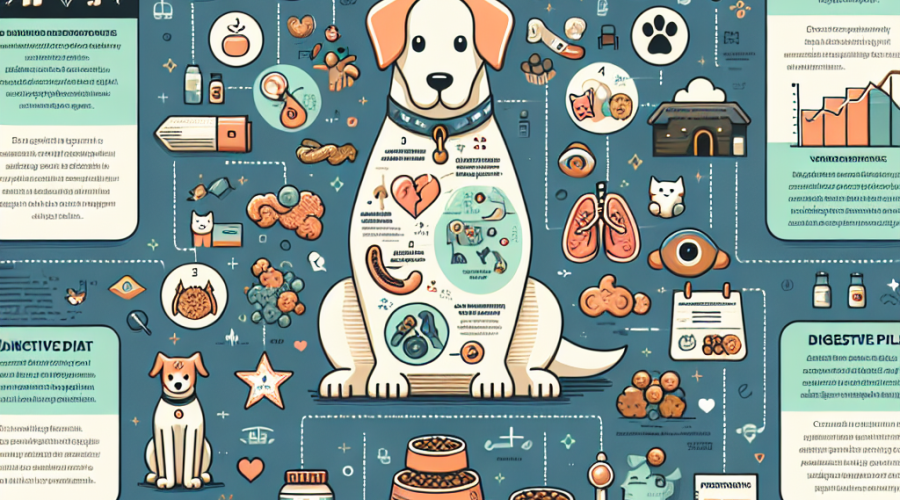Decoding the Mysteries of Your Pet’s Digestive Health: A Comprehensive Guide
Just like us, our pets can experience digestive difficulties. Bloating, constipation, diarrhoea – none of it is pleasant, and when it’s happening to your furry friend, it’s even worse. But why does it happen? And what can you do to help?
Understanding your pet’s digestive health is like unlocking a secret language, one that can bring you closer to your pet and help you keep them healthy and happy. Let’s dive into the mysteries of your pet’s digestive health and decode the signs together.
The Journey of Food
Imagine this: you’re on a rollercoaster, whizzing around corners, plunging down drops, and racing up steep climbs. This thrilling ride is, believe it or not, a pretty good analogy for the journey food takes through your pet’s digestive system. It’s a wild ride from mouth to tail, and it’s essential for your pet’s health.
Food starts in the mouth, where teeth tear and grind it into smaller pieces. Saliva contains special enzymes that start breaking down the food right away, kick-starting the digestive process. Just like your rollercoaster car, the food is then pushed along to the next stage: the stomach.
Stomach and Beyond
In the stomach, food is further broken down by stomach acid and more enzymes. It’s like the big drop on the rollercoaster – it’s where a lot of the action happens. Once the food is broken down into a soupy mixture, it moves into the small intestine, where nutrients are absorbed into the body.
But what happens when this process goes off the rails? Just like a rollercoaster going off track, it can lead to all sorts of problems.
Digestive Disorders in Pets
Digestive disorders in pets can be caused by a variety of factors, from eating something they shouldn’t have to infection or disease. Symptoms can include vomiting, diarrhoea, loss of appetite, and weight loss. If you notice these signs, it’s time to take your pet to the vet, just like you’d call a mechanic if your car started making strange noises.
Diagnosing Digestive Problems
Your vet will likely start by asking you about your pet’s symptoms and diet. They might also conduct a physical examination and run tests, such as blood tests or imaging studies. By putting together all these pieces of information, your vet can diagnose the problem and recommend a treatment plan.
Treatment Options
Treatment for digestive disorders in pets depends on the underlying cause. It could be as simple as a change in diet or medication. In more severe cases, your pet might need surgery.
Preventing Digestive Problems
So, how can you keep your pet’s digestive system running smoothly, like a well-oiled rollercoaster? A balanced, high-quality diet is key. Regular exercise can also help, as can regular vet check-ups.
Remember, it’s normal for your pet to have an off day now and then. But if you notice persistent or severe symptoms, it’s time to seek veterinary help. By understanding your pet’s digestive health, you’re well-equipped to notice when something is wrong and take action.
In the end, it’s all about ensuring your pet is healthy and happy. After all, a healthy pet is a happy pet, and a happy pet makes for a happy pet parent. And isn’t that what we all want?
So, next time your pet has a digestive upset, remember the rollercoaster analogy. It’s a wild ride, but with your new understanding of your pet’s digestive health, you’re in the driver’s seat. Buckle up, and happy travels!
Decoding the mysteries of your pet’s digestive health doesn’t have to be a daunting task. With a little knowledge and understanding, it can be a rewarding journey that strengthens the bond between you and your pet. So, keep your eyes open, your mind curious, and your heart full of love for your furry friend. After all, they rely on you for their health and happiness, and that’s a responsibility we should all take to heart.
FAQs
Q: What are some common signs of digestive issues in pets?
A: Pets with digestive problems may exhibit signs such as vomiting, diarrhoea, loss of appetite, and lethargy. You may also notice changes in their stool, like blood or mucus, which can indicate a serious condition.
Q: How can diet affect my pet’s digestive health?
A: A balanced, high-quality diet is crucial for your pet’s digestive health, as it provides the necessary nutrients for optimal digestion. On the other hand, a poor diet can lead to issues such as obesity, pancreatitis, and gastrointestinal disturbances.
Q: How can I improve my pet’s digestive health?
A: Regular exercise and a balanced diet can significantly improve your pet’s digestive health. Additionally, regular vet check-ups can help identify any issues early and ensure your pet is getting the right nutrients.
Q: Does my pet’s age affect their digestive health?
A: Yes, a pet’s age can significantly affect their digestive health, with older pets typically being more prone to digestive issues. This is due to changes in metabolism and the decreased efficiency of their digestive system.
Q: Can stress impact my pet’s digestion?
A: Stress can indeed impact your pet’s digestion, potentially leading to issues like diarrhoea or constipation. Ensuring your pet has a calm, stable environment can contribute to maintaining good digestive health.

